【最新】广州教科版英语六年级下册每单元知识点总结及练习
- 格式:docx
- 大小:67.21 KB
- 文档页数:36
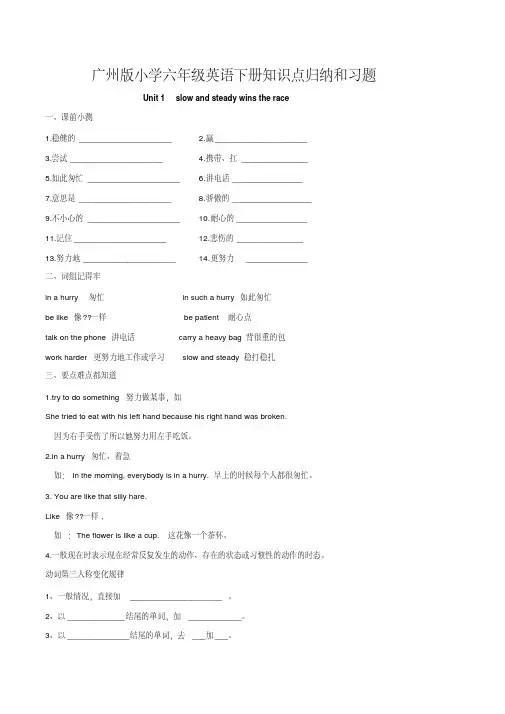
广州版小学六年级英语下册知识点归纳和习题Unit 1 slow and steady wins the race一、课前小测1.稳健的_____________________2.赢_____________________3.尝试_____________________4.携带、扛_______________5.如此匆忙_____________________6.讲电话________________7.意思是_____________________ 8.骄傲的__________________9.不小心的_____________________ 10.耐心的________________11.记住_____________________ 12.悲伤的_______________13.努力地_____________________ 14.更努力______________二、词组记得牢in a hurry 匆忙in such a hurry 如此匆忙be like 像??一样be patient 耐心点talk on the phone 讲电话carry a heavy bag 背很重的包work harder 更努力地工作或学习slow and steady 稳打稳扎三、要点难点都知道1.try to do something 努力做某事,如She tried to eat with his left hand because his right hand was broken.因为右手受伤了所以她努力用左手吃饭。
2.in a hurry 匆忙、着急如:In the morning, everybody is in a hurry.早上的时候每个人都很匆忙。
3. You are like that silly hare.Like 像??一样,如:The flower is like a cup. 这花像一个茶杯。
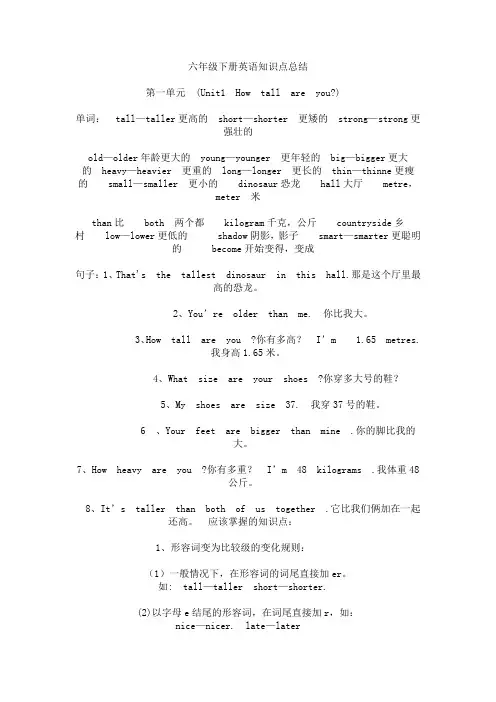
六年级下册英语知识点总结第一单元(Unit1 How tall are you?)单词:tall—taller更高的short—shorter 更矮的strong—strong更强壮的old—older年龄更大的young—younger 更年轻的big—bigger更大的heavy—heavier 更重的long—longer 更长的thin—thinne更瘦的small—smaller 更小的dinosaur恐龙hall大厅metre,meter 米than比both 两个都kilogram千克,公斤countryside乡村low—lower更低的shadow阴影,影子smart—smarter更聪明的become开始变得,变成句子:1、That's the tallest dinosaur in this hall.那是这个厅里最高的恐龙。
2、You’re older than me. 你比我大。
3、How tall are you ?你有多高?I’m 1.65 metres.我身高1.65米。
4、What size are your shoes ?你穿多大号的鞋?5、My shoes are size 37. 我穿37号的鞋。
6 、Your feet are bigger than mine .你的脚比我的大。
7、How heavy are you ?你有多重?I’m48 kilograms .我体重48公斤。
8、It’s taller than both of us together .它比我们俩加在一起还高。
应该掌握的知识点:1、形容词变为比较级的变化规则:(1)一般情况下,在形容词的词尾直接加er。
如: tall—taller short—shorter.(2)以字母e结尾的形容词,在词尾直接加r,如:nice—nicer. late—later(3)以重读闭音节结尾,且结尾只有一个辅音字母的词,先双写这个辅音字母,再加er.如:big—bigger thin—thinner fat—fatter(4)以辅音字母加y结尾的双音节形容词,先变y为i , 再加er。
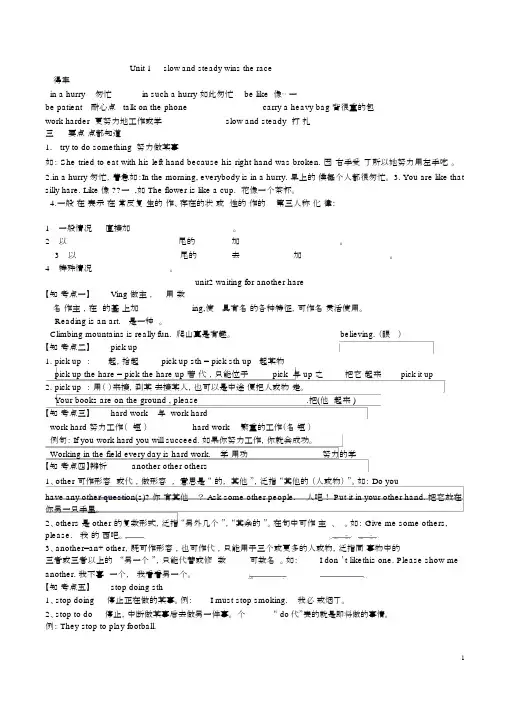
Unit 1slow and steady wins the race得牢in a hurry匆忙in such a hurry 如此匆忙be like 像⋯一be patient耐心点talk on the phone carry a heavy bag 背很重的包work harder 更努力地工作或学slow and steady 打扎三要点点都知道1. try to do something 努力做某事如: She tried to eat with his left hand because his right hand was broken. 因右手受了所以她努力用左手吃。
2.in a hurry 匆忙,着急如:In the morning, everybody is in a hurry. 早上的候每个人都很匆忙。
3. You are like that silly hare. Like 像 ??一 ,如 The flower is like a cup. 花像一个茶杯。
4.一般在表示在常反复生的作、存在的状或性的作的第三人称化律:1 一般情况直接加_____________________。
2 以 _____________________尾的加_____________________。
3 以 _____________________尾的去___________加___________________。
4 特殊情况 ________________。
unit2 waiting for another hare【知考点一】Ving 做主,用数名作主,在的基上加ing,使具有名的各种特征,可作名灵活使用。
Reading is an art. 是一种。
Climbing mountains is really fun. 爬山真是有趣。
_________ __________ believing. (眼)【知考点二】pick up1. pick up :起,拾起pick up sth = pick sth up 起某物pick up the hare = pick the hare up 若代,只能位于pick 与 up 之把它起来pick it up2.pick up :用()来接,到某去接某人,也可以是中途便把人或物走。
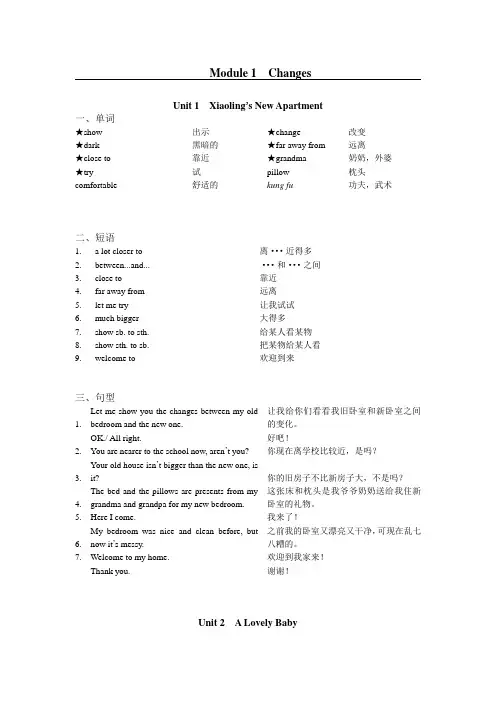
Module 1 ChangesUnit 1 Xiaoling’s New Apartment一、单词★show 出示★change 改变★dark 黑暗的★far away from 远离★close to 靠近★grandma 奶奶,外婆★try 试pillow 枕头comfortable 舒适的kung fu 功夫,武术二、短语1. a lot closer to 离···近得多2. between...and... ···和···之间3. close to 靠近4. far away from 远离5. let me try 让我试试6. much bigger 大得多7. show sb. to sth. 给某人看某物8. show sth. to sb. 把某物给某人看9. welcome to 欢迎到来三、句型1. Let me show you the changes between my oldbedroom and the new one.让我给你们看看我旧卧室和新卧室之间的变化。
OK./ All right. 好吧!2. You are nearer to the school now, aren’t you? 你现在离学校比较近,是吗?3. Your old house isn’t bigger than the new one, isit? 你的旧房子不比新房子大,不是吗?4. The bed and the pillows are presents from mygrandma and grandpa for my new bedroom.这张床和枕头是我爷爷奶奶送给我住新卧室的礼物。
5. Here I come. 我来了!6. My bedroom was nice and clean before, butnow it’s messy.之前我的卧室又漂亮又干净,可现在乱七八糟的。
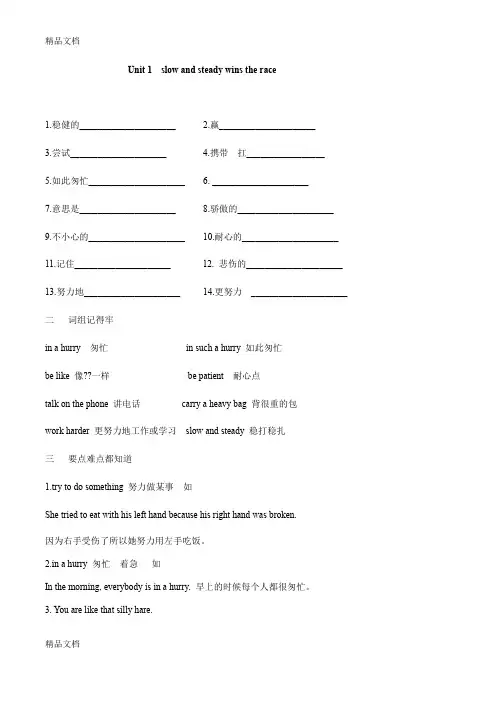
Unit 1 slow and steady wins the race1.稳健的_____________________2.赢_____________________3.尝试_____________________4.携带扛_________________5.如此匆忙_____________________6. _____________________7.意思是_____________________ 8.骄傲的_____________________ 9.不小心的_____________________ 10.耐心的_____________________ 11.记住_____________________ 12. 悲伤的_____________________ 13.努力地_____________________ 14.更努力_____________________ 二词组记得牢in a hurry 匆忙in such a hurry 如此匆忙be like 像??一样be patient 耐心点talk on the phone 讲电话carry a heavy bag 背很重的包work harder 更努力地工作或学习slow and steady 稳打稳扎三要点难点都知道1.try to do something 努力做某事如She tried to eat with his left hand because his right hand was broken.因为右手受伤了所以她努力用左手吃饭。
2.in a hurry 匆忙着急如In the morning, everybody is in a hurry. 早上的时候每个人都很匆忙。
3. You are like that silly hare.Like 像??一样,如The flower is like a cup. 这花像一个茶杯。
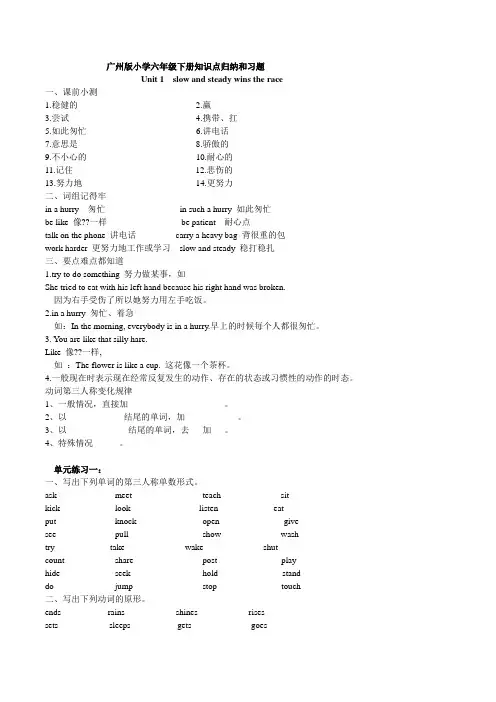
广州版小学六年级下册知识点归纳和习题Unit 1 slow and steady wins the race一、课前小测1.稳健的_____________________2.赢_____________________3.尝试_____________________4.携带、扛_______________5.如此匆忙_____________________6.讲电话________________7.意思是_____________________ 8.骄傲的__________________9.不小心的_____________________ 10.耐心的________________11.记住_____________________ 12.悲伤的_______________13.努力地_____________________ 14.更努力______________二、词组记得牢in a hurry 匆忙in such a hurry 如此匆忙be like 像??一样be patient 耐心点talk on the phone 讲电话carry a heavy bag 背很重的包work harder 更努力地工作或学习slow and steady 稳打稳扎三、要点难点都知道1.try to do something 努力做某事,如She tried to eat with his left hand because his right hand was broken.因为右手受伤了所以她努力用左手吃饭。
2.in a hurry 匆忙、着急如:In the morning, everybody is in a hurry.早上的时候每个人都很匆忙。
3. You are like that silly hare.Like 像??一样,如:The flower is like a cup. 这花像一个茶杯。
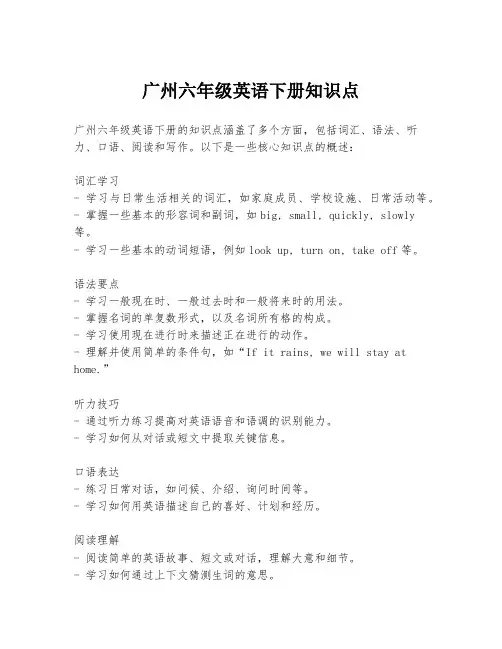
广州六年级英语下册知识点广州六年级英语下册的知识点涵盖了多个方面,包括词汇、语法、听力、口语、阅读和写作。
以下是一些核心知识点的概述:词汇学习- 学习与日常生活相关的词汇,如家庭成员、学校设施、日常活动等。
- 掌握一些基本的形容词和副词,如big, small, quickly, slowly 等。
- 学习一些基本的动词短语,例如look up, turn on, take off等。
语法要点- 学习一般现在时、一般过去时和一般将来时的用法。
- 掌握名词的单复数形式,以及名词所有格的构成。
- 学习使用现在进行时来描述正在进行的动作。
- 理解并使用简单的条件句,如“If it rains, we will stay at home.”听力技巧- 通过听力练习提高对英语语音和语调的识别能力。
- 学习如何从对话或短文中提取关键信息。
口语表达- 练习日常对话,如问候、介绍、询问时间等。
- 学习如何用英语描述自己的喜好、计划和经历。
阅读理解- 阅读简单的英语故事、短文或对话,理解大意和细节。
- 学习如何通过上下文猜测生词的意思。
写作技能- 学习写简单的句子和段落,如自我介绍、描述一天的活动等。
- 练习写日记或书信,表达个人情感和观点。
文化知识- 了解一些英语国家的文化习俗,如节日庆祝方式、饮食习惯等。
复习和测试- 定期复习所学知识,通过练习题和模拟测试来巩固学习成果。
结束语六年级的英语学习是一个重要的阶段,它为学生打下了坚实的基础,为今后更高级的英语学习做好准备。
通过不断的练习和应用,学生们可以更加自信地使用英语进行交流。
希望以上的知识点能够帮助学生们更好地掌握六年级英语下册的内容。
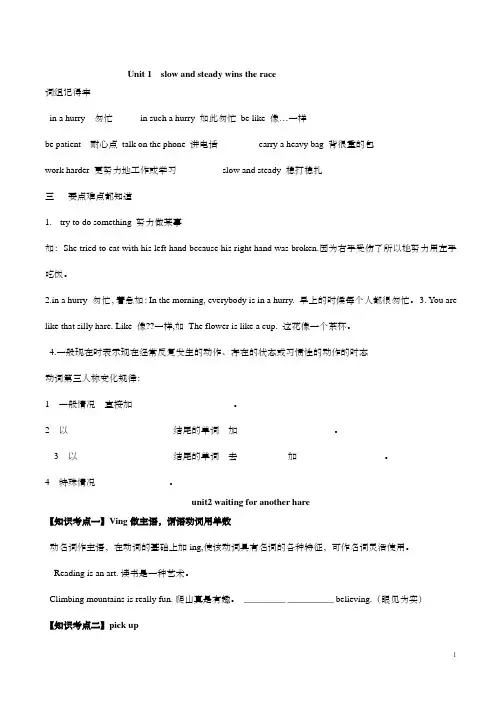
Unit 1 slow and steady wins the race词组记得牢in a hurry 匆忙in such a hurry 如此匆忙be like 像…一样be patient 耐心点talk on the phone 讲电话carry a heavy bag 背很重的包work harder 更努力地工作或学习slow and steady 稳打稳扎三要点难点都知道1.try to do something 努力做某事如:She tried to eat with his left hand because his right hand was broken.因为右手受伤了所以她努力用左手吃饭。
2.in a hurry 匆忙,着急如:In the morning, everybody is in a hurry. 早上的时候每个人都很匆忙。
3. You are like that silly hare. Like 像??一样,如The flower is like a cup. 这花像一个茶杯。
4.一般现在时表示现在经常反复发生的动作、存在的状态或习惯性的动作的时态动词第三人称变化规律:1一般情况直接加_____________________ 。
2以_____________________ 结尾的单词加_____________________。
3以_____________________结尾的单词去___________加___________________。
4特殊情况________________。
unit2 waiting for another hare【知识考点一】Ving做主语,谓语动词用单数动名词作主语,在动词的基础上加ing,使该动词具有名词的各种特征,可作名词灵活使用。
Reading is an art. 读书是一种艺术。
Climbing mountains is really fun. 爬山真是有趣。
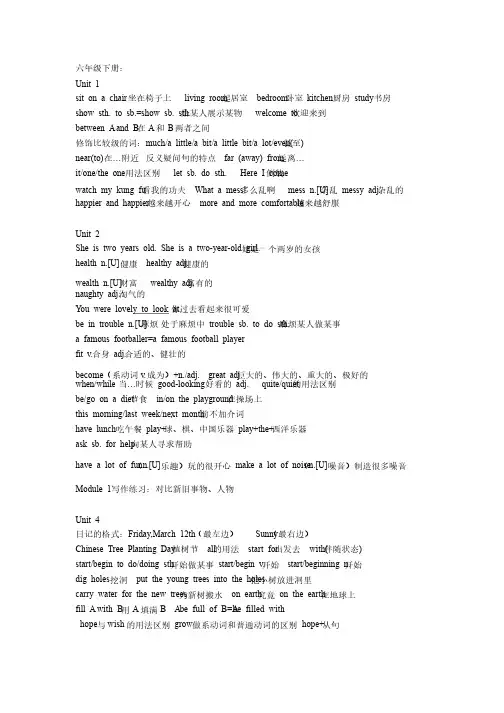
六年级下册:六年级下册:Unit 1 sit on a chair 书房起居室 bedroom卧室 kitchen厨房 study书房坐在椅子上 living room show sth. to sb.=show sb. sth.欢迎来到给某人展示某物 welcome to欢迎来到between A and B 在A和B两者之间 甚至) 修饰比较级的词:much/a little/a bit/a little bit/a lot/even(near(to)在…附近 反义疑问句的特点 far (away) from 远离…it/one/the one用法区别 let sb. do sth. Here I come倒装倒装watch my kung fu 看我的功夫 What a mess! 杂乱的多么乱啊 mess n.[U]杂乱 messy adj.杂乱的happier and happier越来越开心 more and more comfortable 越来越舒服 Unit 2 She is two years old. She is a two-year-old girl.她是一个两岁的女孩她是一个两岁的女孩health n.[U] 健康健康的健康 healthy adj.健康的wealth n.[U]财富 wealthy adj.富有的富有的naughty adj.淘气的淘气的淘气的Y ou were lovely to look at.你过去看起来很可爱 be in trouble n.[U]麻烦麻烦 处于麻烦中 trouble sb. to do sth.麻烦某人做某事麻烦某人做某事a famous footballer=a famous football player fit v.合身 adj.合适的、健壮的合适的、健壮的合适的、健壮的become(系动词v.成为)+n./adj. great adj.巨大的、伟大的、重大的、极好的巨大的、伟大的、重大的、极好的when/while 当…时候 good-looking 好看的好看的 adj. quite/quiet的用法区别的用法区别be/go on a diet 节食 in/on the playground 在操场上 this morning/last week/next month前不加介词前不加介词前不加介词have lunch吃午餐 play+球、棋、中国乐器 play+the+西洋乐器西洋乐器ask sb. for help向某人寻求帮助向某人寻求帮助 have a lot of fun(n.[U]乐趣)玩的很开心 make a lot of noise噪音)制造很多噪音(n.[U]噪音)制造很多噪音Module 1写作练习:对比新旧事物、人物写作练习:对比新旧事物、人物Unit 4 (最右边)日记的格式:Friday,March 12th(最左边) Sunny(最右边)Chinese Tree Planting Day 植树节 all的用法的用法 start for 出发去 with(伴随状态) start/begin to do/doing sth.开始做某事 start/begin v.开始开始开始 start/beginning n.开始dig holes 挖洞把小树放进洞里 挖洞 put the young trees into the holescarry water for the new trees 究竟 on the earth在地球上在地球上为新树搬水 on earth究竟在地球上 be filled with be full of B=Afill A with B 用A填满B A be full of B=A hope与wish的用法区别 grow做系动词和普通动词的区别 hope+从句从句plant some seeds in the pot 种一些种子在坛子里 some small shoots appear/come out 一些小芽出现了一些小芽出现了It It’’s time to pick up the fruit.(n.[U]水果)水果) 是捡起水果的时候了 pick v.摘、挑选 pick up 捡起捡起 She picks fruit off the tree. 她从树上摘下水果她从树上摘下水果on a plate/tray 在盘子/托盘上 keep a diary 记日记 help sb. a lot 帮助某人许多(v.+ a lot ) happen=take place 发生 leaf →leaves n.树叶树叶[C] Unit 5 by the road 在路边 in front of 在…的前边(外部)的前边(外部)crash into 撞上撞上 a car crash 一场车祸 cut down 砍倒砍倒 try to do努力做… let let’’s 中的’s 是us 不是is move …into 把…搬进… move v.移动、搬家 moving adj.感人的感人的 dig dig……out 把…挖出来 water the tree 给树浇水 save v.拯救、节约、节省拯救、节约、节省 save the broken tree 拯救损坏的树 broken adj.损坏的 this/that/these/those 指示代词指示代词Module 2写作练习:做一件事的过程,描述一天的活动做一件事的过程,描述一天的活动Unit 7 famous historical (adj.历史上的)=historic (adj.历史上著名的)历史上著名的)be born 出生,其后加的介词由所跟时间地点决定出生,其后加的介词由所跟时间地点决定the father of modern China 中国的现代之父 ancient adj.古代的古代的 mean v.意思是 What do/does/did …mean=What is/are/was/were the meaning of.. …的意思是? tell sb sth.=tell sth. to sb. 告诉某人某事 tell sb. about sth.告诉某人关于某事告诉某人关于某事 against prep.反对反对 change v .改变 n.变化变化[C] 零钱[U] free v.解放 adj.免费的、自由的,有空的免费的、自由的,有空的finally/at last/in the end 最后 宾语从句(that) the Dr Sun Y atsen Memorial Hall 孙中山纪念堂 all right 行 That ’s all right 不客气/没关系 That ’s right 对的对的对的 president n.总统总统 premier n.总理 the great leader of China 中国的伟大领导人中国的伟大领导人 make an important speech 做一个重要的演讲 It doesn ’t matter. 没关系没关系have gone to/have been to/have been in 用法区别用法区别Unit 8 that 的用法:上文提到的事物、人物 hero/heroine a lot of=lots of=plenty of +可数复数名词/不可数名词 大量大量大量 in the 14th century 在第14世纪 talk about sth. 谈论关于某事谈论关于某事live in the forest 住在森林 the poor 穷人 the+adj.表示一类人表示一类人+are give sth. to sb.=give sb. sth.给某人某物 from…to to……从…到…I think so. 我也这么认为 a cartoon of … …的卡通的卡通sth. be for free 某物是免费的 sth. be free for sb. 某物对某人是免费的 wood n.[U]木头 woods n.[C]森林森林the Olympics=the Olympic Games the Asian Games were held in Guangzhou. Lu Xun was a great Chinese writer.(n.[C]作家) Module 3写作练习:描写一个人物写作练习:描写一个人物Unit10 Chinese Ancient Fables 中国古代寓言中国古代寓言Let me see.让我看看/想想 library card 图书卡 How long may I keep it?(不能用borrow ,因为borrow 是瞬间性动词) borrow (借进) sth. from sb. lend sth.(借出)to sb. 回答how long 提问的句子:two days 两天 for two days 持续两天 mustn mustn’’t 禁止(can,may 表允许时的否定回答) renew (续借)(续借)(续借) in the fields 在田野 field n.田野、场地、领域[C] fall to the ground 摔在地面摔在地面 suddenly adv.突然地突然地take it back home(home,here,there 前不加介词前不加介词) cook v .烹饪 n.厨师厨师 cooker n.炊具炊具 To pick up a hare is certainly easier than to work in the fields 比较的结构要一致比较的结构要一致 from then on 从那时起 from now on 从现在起 say to oneself 自言自语 not …any more 与no more 的互换 not …any 与no 的互换的互换 all day long 一整天 all the year round 一整年 wait for a hare to appear 等待一只野兔出现等待一只野兔出现 wait 的相关题型 can,may,must 表情绪,表允许的用法及否定回答 kind n.种类种类[C] adj.友善的友善的 a kind of 一种… all kinds of 所有种类的… kind of+adj./adv. 有点儿有点儿 be kind to 对…友善友善Unit11 look for 寻找(强调动作)寻找(强调动作) run into跑步撞到 look at 看 like v.喜欢 prep.像…一样 the great king of the animal 万兽之王万兽之王That That’’s very good of you. It is+adj.+for/of sb. to do sth. The mouse was again looking for something to eat. 老鼠再一次寻找吃的东西老鼠再一次寻找吃的东西 v.+again adv.再一次 one more cup of coffee=another one cup of coffee under a tree 在一棵树下 in a net 在一个网中 get out of 从…出来出来go/come up to.. 去/来到…面前 Don ’t worry 不要着急不要着急 make a big hole 弄出一个大洞弄出一个大洞 eat up 吃光吃光 at first=at the beginning 在起初 if 引导的条件状语从句用于“主将从现”引导的条件状语从句用于“主将从现” answer one ’s question 回答某人的问题回答某人的问题 of the three 在三者之中(最高级)在三者之中(最高级)Module 4 写作练习:讲一个故事,如续写乌鸦喝水的故事写作练习:讲一个故事,如续写乌鸦喝水的故事写作练习:讲一个故事,如续写乌鸦喝水的故事Unit13 hope 与wish 的用法区别 宾语从句(I ’m sure/afraid that ) I hope so.我希望如此(so 代指上文提到的)代指上文提到的) Well done. 做的好 want to do sth.想要做… I want to be a runner. grow up 长大 run for China 为中国奔跑 in the 2012 Olympic Games in London 在2012年在伦敦的奥运会年在伦敦的奥运会有地点状语,时间状语,先写地点状语再写时间状语有地点状语,时间状语,先写地点状语再写时间状语Good luck 祝你好运祝你好运 fall over 摔倒 on the floor 在地板上 on the second floor 在第二层在第二层 dream about 梦想 be good at=do well in+doing 擅长于做.. 职业:ambulance ambulance man man 救护人员救护人员 nurse 护士护士 doctor 医生医生 policeman 男警察男警察 post post man man 邮递员 factory worker 工厂工人工厂工人 soldier 士兵士兵 farmer 农夫农夫cook 厨师 fireman 消防员消防员消防员Unit14 act out the dialogue 演出对话演出对话 act in pairs 两人一组表演 go to see a film 去看电影 the film about the Monkey King 关于猴王的电影关于猴王的电影 Me too.我也是我也是 That ’s fantastic.那太棒了那太棒了那太棒了 have fun= have a good time=enjoy oneself 玩的开心玩的开心magic stick 魔棒魔棒 It ’s time for you to go home.现在是你回家的时间现在是你回家的时间 take/have a look at 看一看 run away 跑开 meet at eight or ten o ’clock 在8点或10点见面点见面 There is a pair of shoes. 就近原则,量词+名词的组合以量词为判断依据名词的组合以量词为判断依据 词形变化:词形变化:farm → farmer write →writer report →reporter walk →walker garden →gardener any 用于肯定句翻译为“任何”用于肯定句翻译为“任何”Module 5写作练习:描述梦想或幻想(hope 或wish) 。
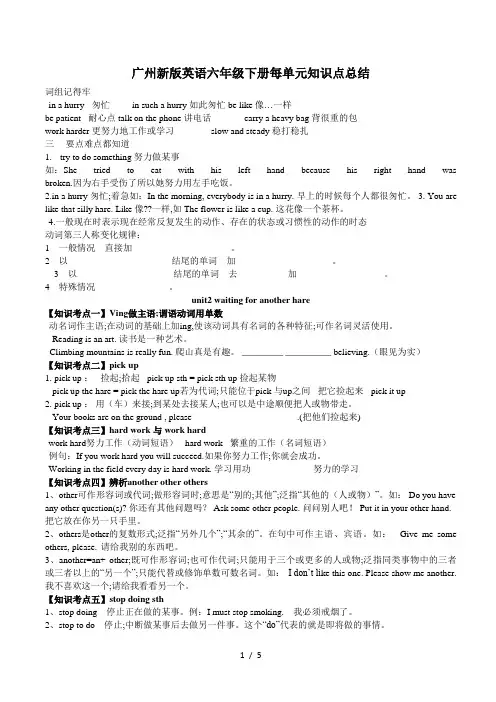
广州新版英语六年级下册每单元知识点总结词组记得牢in a hurry 匆忙in such a hurry 如此匆忙 be like 像…一样be patient 耐心点 talk on the phone 讲电话carry a heavy bag 背很重的包work harder 更努力地工作或学习slow and steady 稳打稳扎三要点难点都知道1.try to do something 努力做某事如:She tried to eat with his left hand because his right hand was broken.因为右手受伤了所以她努力用左手吃饭。
2.in a hurry 匆忙;着急如:In the morning, everybody is in a hurry. 早上的时候每个人都很匆忙。
3. You are like that silly hare. Like 像??一样,如 The flower is like a cup. 这花像一个茶杯。
4.一般现在时表示现在经常反复发生的动作、存在的状态或习惯性的动作的时态动词第三人称变化规律:1一般情况直接加_____________________ 。
2以_____________________ 结尾的单词加_____________________。
3以_____________________结尾的单词去___________加___________________。
4特殊情况________________。
unit2 waiting for another hare【知识考点一】Ving做主语;谓语动词用单数动名词作主语;在动词的基础上加ing,使该动词具有名词的各种特征;可作名词灵活使用。
Reading is an art. 读书是一种艺术。
Climbing mountains is really fun. 爬山真是有趣。
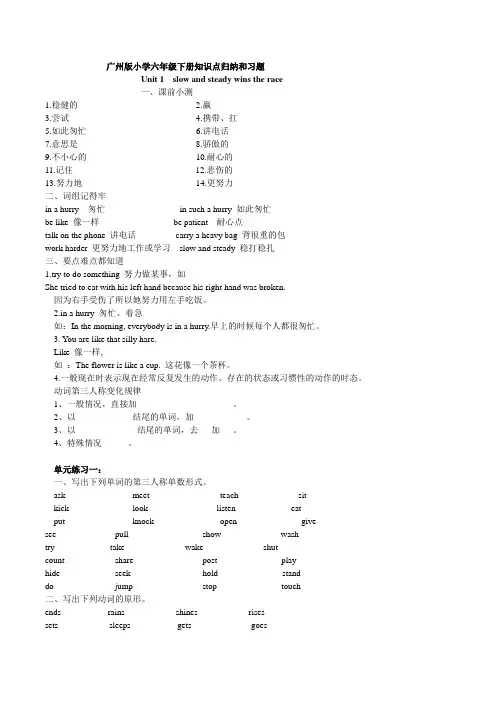
广州版小学六年级下册知识点归纳和习题Unit 1 slow and steady wins the race一、课前小测1.稳健的_____________________2.赢_____________________3.尝试_____________________4.携带、扛_______________5.如此匆忙_____________________6.讲电话________________7.意思是_____________________ 8.骄傲的__________________9.不小心的_____________________ 10.耐心的________________11.记住_____________________ 12.悲伤的_______________13.努力地_____________________ 14.更努力______________二、词组记得牢in a hurry 匆忙in such a hurry 如此匆忙be like 像一样be patient 耐心点talk on the phone 讲电话carry a heavy bag 背很重的包work harder 更努力地工作或学习slow and steady 稳打稳扎三、要点难点都知道1.try to do something 努力做某事,如She tried to eat with his left hand because his right hand was broken.因为右手受伤了所以她努力用左手吃饭。
2.in a hurry 匆忙、着急如:In the morning, everybody is in a hurry.早上的时候每个人都很匆忙。
3. You are like that silly hare.Like 像一样,如:The flower is like a cup. 这花像一个茶杯。
广州版小学六年级下册知识点归纳和习题全册集团标准化工作小组 [Q8QX9QT-X8QQB8Q8-NQ8QJ8-M8QMN]广州版小学六年级下册知识点归纳和习题Unit 1 slow and steady wins the race一、课前小测1.稳健的_____________________2.赢_____________________3.尝试_____________________4.携带、扛_______________5.如此匆忙_____________________6.讲电话________________7.意思是_____________________ 8.骄傲的__________________ 9.不小心的_____________________ 10.耐心的________________11.记住_____________________ 12.悲伤的_______________13.努力地_____________________ 14.更努力 ______________二、词组记得牢in a hurry 匆忙 in such a hurry 如此匆忙be like 像一样 be patient 耐心点talk on the phone 讲电话 carry a heavy bag 背很重的包work harder 更努力地工作或学习 slow and steady 稳打稳扎三、要点难点都知道to do something 努力做某事,如She tried to eat with his left hand because his right hand was broken.因为右手受伤了所以她努力用左手吃饭。
a hurry 匆忙、着急如:In the morning, everybody is in a hurry.早上的时候每个人都很匆忙。
3. You are like that silly hare.Like 像一样,如:The flower is like a cup. 这花像一个茶杯。
Unit 1 slow and steady wins the race1.稳健的__________________2.赢__________________3.尝试_____________________4.携带扛_____________5.如此匆忙_________________6.愚蠢的_____________________7.意思是_____________________ 8.骄傲的_____________________9.不小心的___________________ 10.耐心的_____________________11.记住_____________________ 12. 悲伤的_____________________13.努力地_____________________ 14.更努力_____________________二词组记得牢in a hurry 匆忙in such a hurry 如此匆忙be like 像??一样be patient 耐心点talk on the phone 讲电话carry a heavy bag 背很重的包work harder 更努力地工作或学习slow and steady 稳打稳扎三要点难点都知道1.try to do something 努力做某事如因为右手受伤了所以她努力用左手吃饭。
2.in a hurry 匆忙着急如早上的时候每个人都很匆忙。
3. You are like that silly hare. Like 像??一样,如The flower is like a cup. 这花像一个茶杯。
4.一般现在时表示现在经常反复发生的动作、存在的状态或习惯性的动作的时态动词第三人称变化规律一般情况直接加_____________________ 。
以_____________________ 结尾的单词加_____________________。
以_____________________结尾的单词去___________加___________________。
特殊情况________________。
模块练习一、写出下列单词的第三人称单数形式。
ask---- meet---- teach---- sit----kick---- look---- listen---- eat----put---- knock---- open---- give----see---- pull---- show---- wash----try---- take---- wake---- shut----count---- share---- post---- play----hide---- seek---- hold---- stand----do---- jump---- stop---- touch----二、写出下列动词的原形。
ends---- rains---- shines---- rises----sets---- sleeps---- gets---- goes----stays---- arrives---- walks---- drives----spends---- forecasts---- fixes---- works----travels---- cleans----三、用所给动词的一般现在时填空。
1. We often____________ (play) in the playground.2. He____________ (get) up at six o’clock.3. ____________ you____________ (brush) your teeth every morning?4. What____________ (do) he usually____________ (do) after school?5. Danny____________ (study) English, Chinese, Math at school.6. Mike sometimes____________ (go) to the park with his sister.7. At eight at night, she ____________ (watch) TV with his family.8. ____________ Mike____________ (read) English every day?9. How many lessons____________ your classmate____________ (have) on Monday?10. What time____________ his mother____________ (do) the housework?四单元练一练笔试部分四.找出下列每组单词种不同类的词( ) 1. A. runner B.winner C.farmer D.worker( ) 2. A. race B.game C.sleep D.match( ) 3 .A. want B.dream C.well D.fall( ) 4. A. Asia B.China C.Europe D.Africa( ) 5. A. dream B.fell C.got D.had五选择填空。
1. What are you doing? I am trying to________the bike.A. ridingB. rideC. ridesD. rided2. If you want to win the game, you should be .A. carelessB. careC. carefulD. carefully3. What are you doing? We .A. is playingB. am talking on the phoneC. were playing D talking on the phone4. Don’t eat too fast. A. be B. is C. 不填 D. are5. The old man was very tired he sat down and took a rest.A. soB. butC. becauseD. and6. Where’s my camera? I________it.A. am not findingB. am not seeingC. can’t findD. can’t look at7. How________he go to work? He to work by bike.A. does, goB. do, goesC. do, goD. does, goes8. ________you usually late for school? No, .A. Do, I amB. Does, notC. Are, I’m notD. Are, I aren’t9. ________she________home at six every day?A. Is, leaveB. Does, leaveC. Is, leavesD. Does, left10. Mr. Yang________English this term.A. teaches ourB. teaches usC. teachs usD. teach our六补全对话, 选择正确答案的编号在横线上Chen jie: Hi, Amy! ______________? A: What’s the date?Amy: It’s Wednesday. B: What are we going to see? Chen jie: Oh, let’s go to the zoo this weekend. C: What day is it today? Amy: Good idea! ____________________? D: Where are you going? Chen jie: Let’s see monkeys. They are very smart. E: How can we go there? Amy: OK! _________________________? F: Great!Chen jie: We can go by bike. G:When are we going? Amy: But I have no bike. Let’s go by bus, OK?Chen jie: OK. _________________?Amy: What about eight thirty? Chen jie: ______________.七、按要求改写句子。
play football after school? (改为肯定句)________________________________________________________________________改为否定句)________________________________________________________________________s. (改为否定句)________________________________________________________________________改为一般疑问句)________________________________________________________________________5 I watch TV every day. (改为一般疑问句)________________________________________________________________________改为否定句________________________________________________________________________改为肯定句)________________________________________________________________________八阅读短文判断句子与短文意思是否一致如一致在括号内写否则写F. Many people can use the computer very well ,and they know what a computer is and what it can do. The computer is fast and never makes mistakes, while people are slow and often make mistakes. That’s what people often say when they talk about computers. For many, many years, scientists have improved computers. Now a computer can do a lot of everyday work quite well, and people can use a computer in many ways. Many computer scientists are now thinking of making the computer “think” like a man. With the help of a person, a computer can draw pictures, write music, talk with people, and so on. Maybe computer will one day think and feel. ( ) 1.The computer is fast and never makes mistakes.( ) 2.A computer can do a lot of everyday work quite well.( ) 3.The computer is improved by scientists.( ) 4.A computer can draw pictures, eat the food, and drink the water.( ) 5.Many people can use the computer very well.unit2 waiting for another hare一、Unit 2 单词二、Unit 2词组三、Unit 2句型。